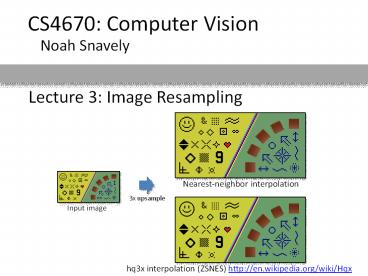Lecture 3: Image Resampling - PowerPoint PPT Presentation
Title:
Lecture 3: Image Resampling
Description:
Noah Snavely Lecture 3: Image Resampling Nearest-neighbor interpolation 3x upsample Input image hq3x interpolation (ZSNES) http://en.wikipedia.org/wiki/Hqx – PowerPoint PPT presentation
Number of Views:342
Avg rating:3.0/5.0
Title: Lecture 3: Image Resampling
1
Lecture 3 Image Resampling
CS4670 Computer Vision
Noah Snavely
Nearest-neighbor interpolation
3x upsample
Input image
hq3x interpolation (ZSNES) http//en.wikipedia.org
/wiki/Hqx
2
Readings
3
Image Scaling
This image is too big to fit on the screen. How
can we generate a half-sized version?
Source S. Seitz
4
Image sub-sampling
1/8
1/4
Throw away every other row and column to create a
1/2 size image - called image sub-sampling
Source S. Seitz
5
Image sub-sampling
1/4 (2x zoom)
1/8 (4x zoom)
1/2
Why does this look so crufty?
Source S. Seitz
6
Image sub-sampling
Source F. Durand
7
Even worse for synthetic images
Source L. Zhang
8
Wagon-wheel effect
(See http//www.michaelbach.de/ot/mot_wagonWheel/i
ndex.html)
Source L. Zhang
9
Aliasing
- Occurs when your sampling rate is not high enough
to capture the amount of detail in your image - Can give you the wrong signal/imagean alias
- To do sampling right, need to understand the
structure of your signal/image - Enter Monsieur Fourier
- To avoid aliasing
- sampling rate 2 max frequency in the image
- said another way two samples per cycle
- This minimum sampling rate is called the Nyquist
rate
Source L. Zhang
10
Nyquist limit 2D example
Good sampling
Bad sampling
11
Aliasing
- When downsampling by a factor of two
- Original image has frequencies that are too high
- How can we fix this?
12
Gaussian pre-filtering
G 1/8
G 1/4
Gaussian 1/2
- Solution filter the image, then subsample
Source S. Seitz
13
Subsampling with Gaussian pre-filtering
G 1/4
G 1/8
Gaussian 1/2
- Solution filter the image, then subsample
Source S. Seitz
14
Compare with...
1/4 (2x zoom)
1/8 (4x zoom)
1/2
Source S. Seitz
15
Gaussian pre-filtering
- Solution filter the image, then subsample
16
Gaussian pyramid
17
Gaussian pyramids Burt and Adelson, 1983
- In computer graphics, a mip map Williams, 1983
- A precursor to wavelet transform
- Gaussian Pyramids have all sorts of applications
in computer vision
Source S. Seitz
18
Gaussian pyramids Burt and Adelson, 1983
- How much space does a Gaussian pyramid take
compared to the original image?
Source S. Seitz
19
Questions?
20
Upsampling
- This image is too small for this screen
- How can we make it 10 times as big?
- Simplest approach
- repeat each row
- and column 10 times
- (Nearest neighbor
- interpolation)
21
Image interpolation
d 1 in this example
1
2
3
4
5
- Recall how a digital image is formed
- It is a discrete point-sampling of a continuous
function - If we could somehow reconstruct the original
function, any new image could be generated, at
any resolution and scale
Adapted from S. Seitz
22
Image interpolation
d 1 in this example
1
2
3
4
5
- Recall how a digital image is formed
- It is a discrete point-sampling of a continuous
function - If we could somehow reconstruct the original
function, any new image could be generated, at
any resolution and scale
Adapted from S. Seitz
23
Image interpolation
d 1 in this example
1
1
2
3
4
5
2.5
- What if we dont know ?
- Convert to a continuous function
- Reconstruct by convolution with a reconstruction
filter, h
Adapted from S. Seitz
24
Image interpolation
Ideal reconstruction
Nearest-neighbor interpolation
Linear interpolation
Gaussian reconstruction
Source B. Curless
25
Reconstruction filters
- What does the 2D version of this hat function
look like?
performs linear interpolation
(tent function) performs bilinear interpolation
- Often implemented without cross-correlation
- E.g., http//en.wikipedia.org/wiki/Bilinear_interp
olation - Better filters give better resampled images
- Bicubic is common choice
Cubic reconstruction filter
26
Image interpolation
Original image x 10
Nearest-neighbor interpolation
Bilinear interpolation
Bicubic interpolation
27
Image interpolation
Also used for resampling
28
Questions?
- 3-minute break































